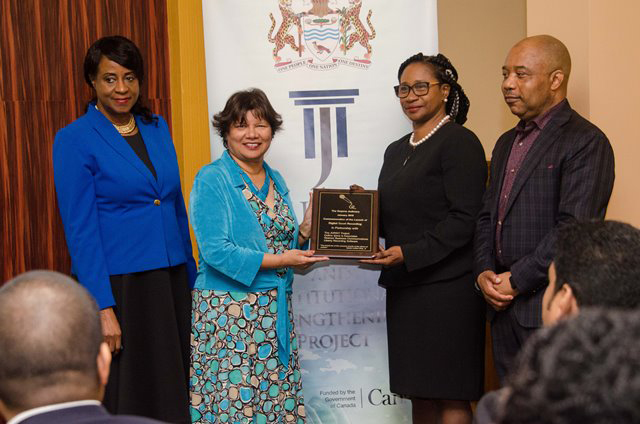Ten digital recording systems have been officially handed over to the judiciary to support the transition to electronic recording of court proceedings throughout the country.
The donation was made by the Judicial Reform and Institution Strengthening (JURIST) Project and the Government of Canada. Since November last year, the JURIST Project has started the training of court personnel in the use, operation and management of the recording systems.
Eight of the systems are in the High Court; one is at the Georgetown Magistrate’s Court; and the other is in the Berbice district.
Speaking at an official presentation ceremony at the Pegasus Hotel yesterday, Canadian High Commissioner to Guyana Lilian Chatterjee highlighted the importance of the judiciary utiliising the available technology. “It’s imperative that the judiciary takes advantage of the technological advancements to enhance the delivery of the total services. This equipment will support the services of the court, particularly through text creation, storage and retrieval, improved access to the law, recording of court proceedings, case management law and production of data for administrative purposes continuing education and communications,” she noted.
According to Chatterjee, the equipment would also make it easier for judges to make electronic copies of their decisions, which would support the preparation of records for appeal purposes. The pace of proceedings is expected to accelerate as the information would be captured accurately and would become more readily available. “These projects are examples of Canada’s commitment to Guyana to help strengthen legal systems and to promote legal reforms that eliminate all forms of discrimination against women, girls as well as women, boys and marginalised groups,” she added.
Acting Chancellor Justice Yonette Cummings-Edwards also said the judicial system must advance and embrace change, which will benefit all stakeholders of the justice system in Guyana. She further noted the desire to have “precise records” of court proceedings and “enhanced delivery” of court decisions and orders throughout the length and breadth.
Justice Cummings-Edwards added that technology will not replace judicial officers but noted that in the hands of the officers it will transform the judicial landscape of the country. “We recall in 2005, the Great Flood in Georgetown damaged files and records. Now, with this method of storing of records, floods may not be able to make an impact. So, delays will become things of the past; backlogs will become things of the past. This technology will allow judges and magistrates to spend more time listening to the evidence rather than having to write down or record what the witness is saying because the record is being captured as the witness gives his or her testimony. So, technology is just a tool for us to get the work done faster,” the judge said.
Meanwhile, Gloria Richards-Johnson, Director of the JURIST Project, told those present at the handing over that the provision of the equipment to the judiciary will also assist the project in achieving one of its overarching objectives—reducing delay and backlogs. “Our aim is to modernise and strengthen court systems, their processes and services and to equip judicial officers and court staff with the skills and competencies necessary to deliver justice in a fair, predictable, efficient and timely manner,” she said, while adding that the ultimate goal is to develop a regional judicial system that’s more responsive to the needs of “women, men, youth and the poor.”
Alicia Lowenfield, the Deputy Registrar of the Supreme Court, expressed her gratitude to the JURIST Project and the Government of Canada and noted that the prospect of no longer having to take notes by hand during trials was welcomed among the ranks of the judiciary. Lowenfield stated that the equipment has been in use for about two months and has gotten positive feedback from the judicial officers who have had direct contact with the equipment. She further said that the devices save time and energy and also lend efficiency to the trial process.
The multi-year JURIST Project, which was funded under a Cdn $19 million arrangement with the government of Canada, is being implemented by the Caribbean Court of Justice (CCJ) on behalf of the Conference of Heads of the Judiciary of CARICOM.
Also present at the handing over ceremony yesterday were Attorney General Basil Williams, judges, magistrates and employees of the Supreme Court.





